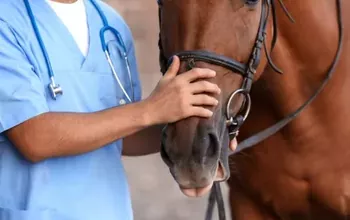
What To Look For When Your Horse Is Sick
Horses are generally considered strong and hardy animals that can perform impressive athletic and work feats, but they are not immune to health issues. It is especially evident if you fail to take good care of your horse. In order to maintain good health, horses need regular and thorough checkups and plenty of attention on a daily basis. Despite doing everything “by the book”, sickness can still strike at any moment. In order to be prepared, you must know how to recognize a sick horse. If something is “off”, you can quickly spot certain symptoms and signs. When sick, every minute counts – so knowing them gives you a much-needed edge!
Horse Sickness Signs
You already know that horses cannot speak. However, they are able to communicate with you in some way. Nature makes things clear in her own way. A horse cannot say what hurts, but it can show it. Be on the lookout for any unusual behaviors or movements. It is worth investigating if your horse suddenly starts doing something you haven’t seen before. Your horse’s behavior will immediately change when it is sick. Sick horses tend to stay in dark and secluded corners of the stable and lack energy and appetite.
The loss of weight is undoubtedly one of the most common signs of illness. It is impossible for a horse to be skinny; it is an elegant and powerful animal. Be alarmed if you notice the outline of their ribcage, for example, and realize that they have lost weight: this is never a good sign. It is common for rapid weight loss to be accompanied by additional ailments, including loss of appetite, constant diarrhea, and apathy.
Depending on the ailment, a horse may drink water excessively or stop drinking water altogether. Similar to the loss of appetite, this is an alarming sign that needs to be addressed as soon as possible. During illness or pain, a horse may become fidgety and strange: any spike or change in activity levels should be investigated. When done near-constantly, excessive sneezing, nasal discharge, neighing and teeth-showing, and snorting might indicate some underlying discomfort.
It is also important to check your horse’s ears frequently. A horse’s ears can communicate just like those of dogs and many other animals. In times of pain, sadness, or illness, their ears may be pushed back against their temples. Your horse might be in pain if they are constantly in this position. It is also possible for their mouths to become infected, causing further health problems. Be sure to check for excess drool, swollen gums, bad breath, and excessive lip rolling. It is important to address these signs of serious oral health problems.
There can also be sudden and dramatic changes in mood or character as a result of pain or discomfort. If your horse is suddenly aggressive and unwilling to cooperate, it might be their way of saying that they are suffering greatly. Rapid breathing, excessive sweating, or stubborn behavior can also accompany such changes.
To determine if something is amiss with your horse, simply observe its behavior: if you see anything unusual, reach out to your veterinarian. Never let the problem get out of control by being late for a check-up.





